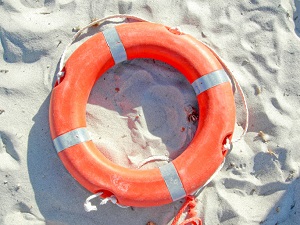 I was not far from the shore in the fickle, warm Gulf of Mexico, a place I love. I was swimming, enjoying the sun, feeling deeply at peace. I loved the smell of the water, the feel of the air. I was carefree and at ease, like a butterfly on honeysuckle.
I was not far from the shore in the fickle, warm Gulf of Mexico, a place I love. I was swimming, enjoying the sun, feeling deeply at peace. I loved the smell of the water, the feel of the air. I was carefree and at ease, like a butterfly on honeysuckle.
Then I was ambushed by a whirlpool, kidnapped from my reverie. I wasn’t paying attention, and I swam right into it, caught before I knew it was there. I’m a strong swimmer, and expected to swim out of the vortex and get back to shore, but I couldn’t. Each time I made it to the edge of the circle, I was forced back by the whirlpool. Each time I thought I was making my escape, I was sucked back in. I kept trying, but I couldn’t get out. I was getting scared. What if I drowned?
I didn’t know it then, but built into every whirlpool is a backdoor, a path to survival, but when you’re in the middle of a whirlpool you can’t see it—you need someone outside, someone standing on the shore, to see you’re in trouble, to help find the solution, to show you the path so you’ll survive.
Lucky for me, there was a lifeguard standing on the shore; I screamed to him for help and he saw what was happening. I expected him to swim to me and rescue me, carry me out of the ocean like you see in the movies. I was prepared to be grateful—but that’s not what happened at all. Instead, he waded in a bit, careful not to get caught in the whirlpool himself, and pointed at something. I was angry; why didn’t he save me? I didn’t know what he was pointing at, but he insisted that I pay attention and pointed again until I saw the path out of that swift, inexorable current.
He was showing me how to escape, how to save myself.
This is like the therapist/client relationship, like what happens when I’m helping a client. I have a different perspective on what’s happening, even if I had a similar experience sometime in the past, in my own life, but to help I will stay slightly apart, so as not to get caught in the whirlpool. I will feel for you, but I’ll keep those feelings in check. It’s almost like being in two places at once—feeling close to your experience but a bit apart, too.
Inside your own whirlpool, you just can’t see. You don’t know what’s happening. Maybe you’ll even have the feeling that you’ve been through something like this before, but you don’t know what to do about it. With relationships, for instance, the kind where you split up and make up, over and over again. Each new breakup feels like other breakups in the past—you keep on breaking up/making up with the same person, and never make it to shore.
I will stand with you but a little to the side. We’ll find your path together, but then you must swim out yourself. I’ll help, but you have to do the work.
Sometimes people get very angry about that: If I know the answer, why don’t I just tell you? If I really cared I would rescue you, right?
I remember when I was in therapy myself. I was about 30 years old, recently divorced, mother of an infant, full-time social worker, and struggling financially. I did not know how to get out. I was stuck. I could not believe how I had arrived in such a miserable place, so I started treatment. I was almost completely hopeless.
My therapist listened to me, felt for and with me, showed me some of my less healthy habits, expanded my ways of thinking, and adjusted my vision. She loved me. She did not quit on me and did not let me quit on myself, either. She did not carry me out of my misery, but she was a positive example and helper, and I emerged, eventually, with a better understanding of the world and my place in it, so I could find my path and make it to shore. You can, too.

The preceding article was solely written by the author named above. Any views and opinions expressed are not necessarily shared by GoodTherapy.org. Questions or concerns about the preceding article can be directed to the author or posted as a comment below.

 The Yoga Prison Project: Lessons on Both Sides of the Bars
The Yoga Prison Project: Lessons on Both Sides of the Bars Riding the Waves of Trauma Symptoms
Riding the Waves of Trauma Symptoms


Please fill out all required fields to submit your message.
Invalid Email Address.
Please confirm that you are human.
Leave a Comment
By commenting you acknowledge acceptance of GoodTherapy.org's Terms and Conditions of Use.